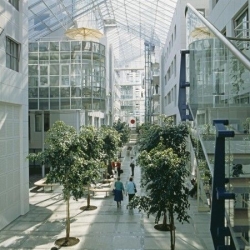To provide the best experiences, we use technologies like cookies to store and/or access device information. Consenting to these technologies will allow us to process data such as browsing behaviour or unique IDs on this site. Not consenting or withdrawing consent, may adversely affect certain features and functions.
The technical storage or access is strictly necessary for the legitimate purpose of enabling the use of a specific service explicitly requested by the subscriber or user, or for the sole purpose of carrying out the transmission of a communication over an electronic communications network.
The technical storage or access is necessary for the legitimate purpose of storing preferences that are not requested by the subscriber or user.
The technical storage or access that is used exclusively for statistical purposes.
The technical storage or access that is used exclusively for anonymous statistical purposes. Without a subpoena, voluntary compliance on the part of your Internet Service Provider, or additional records from a third party, information stored or retrieved for this purpose alone cannot usually be used to identify you.
The technical storage or access is required to create user profiles to send advertising, or to track the user on a website or across several websites for similar marketing purposes.
 The digital edition of issue 14 of IN Magazine is now available to read free, here. Print copies are in the post. We think it’s the best issue we’ve done so far, but please don’t take our word for it. It’s visually stunning, as always. It offers you the usual eclectic mix of content, covering everything from technology to urban design, management issues, property, office design, the environment, wellbeing and transport as well as all the usual interviews, news, events and commentary. All back issues of IN are available here. (more…)
The digital edition of issue 14 of IN Magazine is now available to read free, here. Print copies are in the post. We think it’s the best issue we’ve done so far, but please don’t take our word for it. It’s visually stunning, as always. It offers you the usual eclectic mix of content, covering everything from technology to urban design, management issues, property, office design, the environment, wellbeing and transport as well as all the usual interviews, news, events and commentary. All back issues of IN are available here. (more…)




















 The Sustainable Design Collective, a ‘think tank’ group of leading workplace designers and specifiers, has announced a new Forum Day, together with industry awards, focussed on greater sustainability. Originally formed in January 2022, the Sustainable Design Collective hosts regular meetings to collaborate and discuss new opportunities to promote environmental and social responsibility within the office workplace. The group is now inviting conversations with fellow designers as well as suppliers and manufacturers.
The Sustainable Design Collective, a ‘think tank’ group of leading workplace designers and specifiers, has announced a new Forum Day, together with industry awards, focussed on greater sustainability. Originally formed in January 2022, the Sustainable Design Collective hosts regular meetings to collaborate and discuss new opportunities to promote environmental and social responsibility within the office workplace. The group is now inviting conversations with fellow designers as well as suppliers and manufacturers. 














April 19, 2023
We shouldn’t be deterred by the wonky start to the circular economy
by Becky Gordon • Comment, Environment, Workplace design